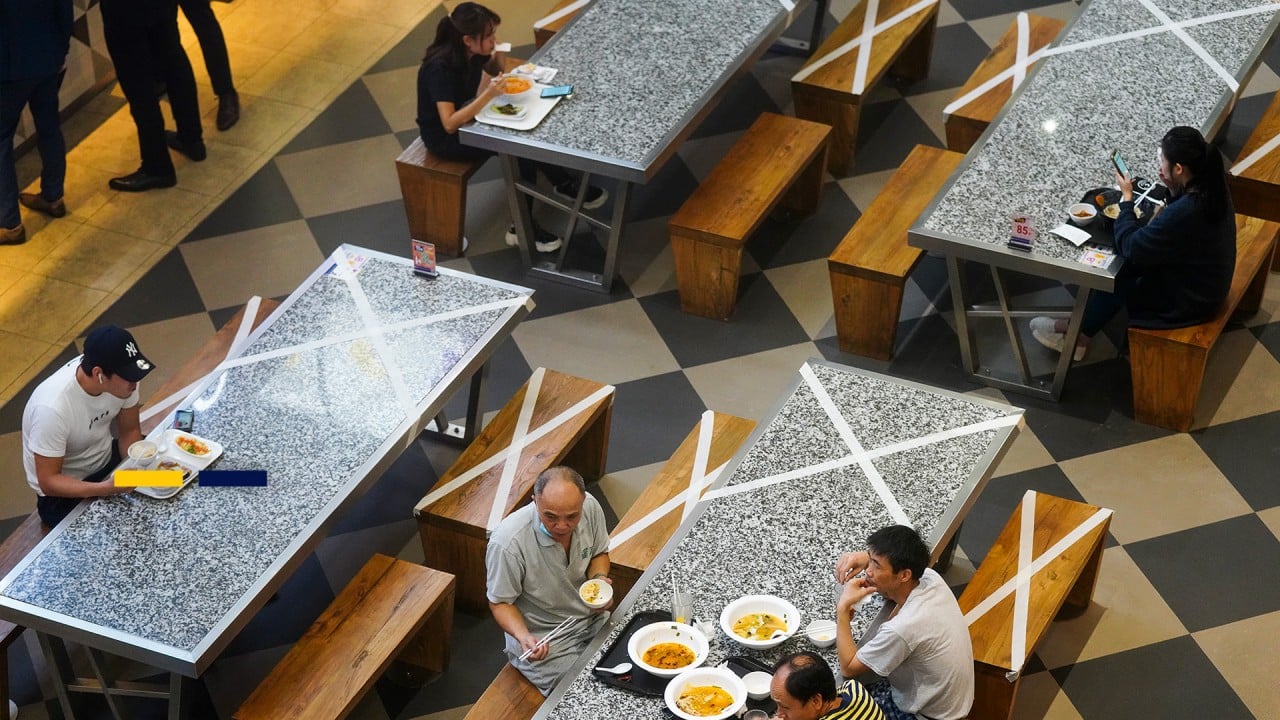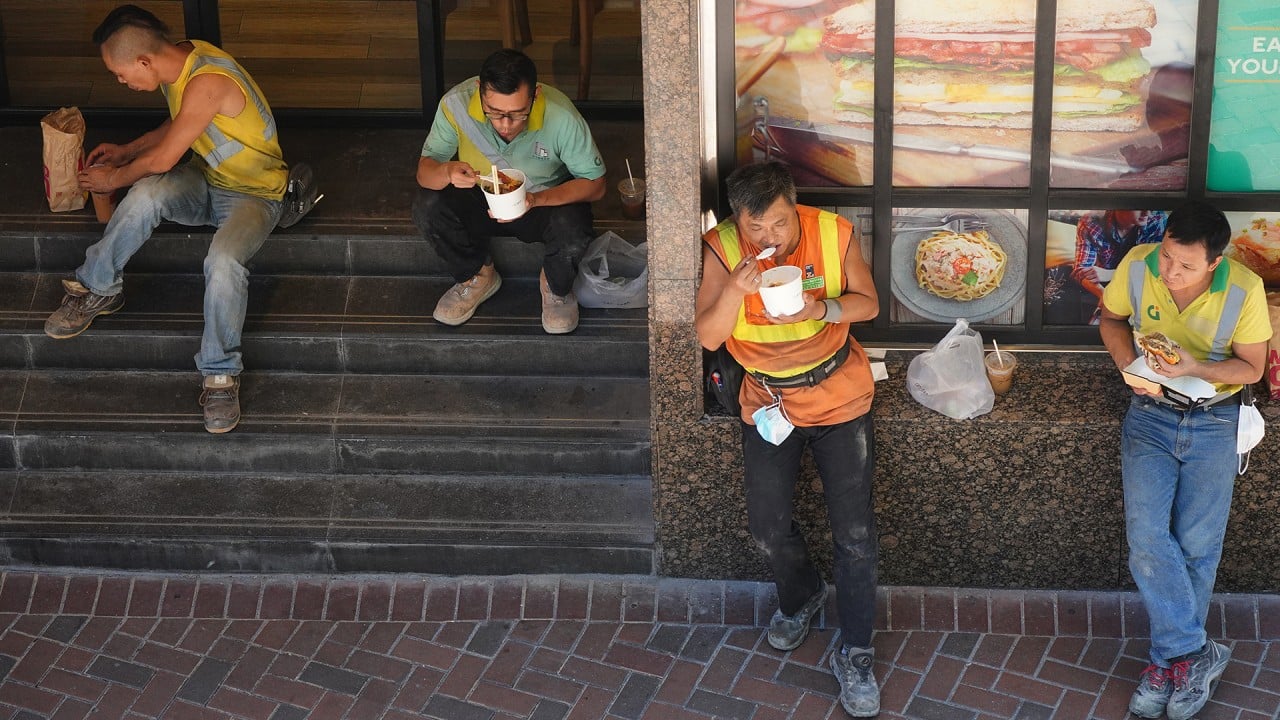
03:13
Hong Kong bans all dine-in services at restaurants in attempt to contain third wave of Covid-19
Hong Kong third wave: officials scrap coronavirus-related ban on eating in restaurants after just 24 hours
- City’s restaurants were told they could only serve takeaway as part of stringent measures to combat Covid-19
- Number of new infections in triple digits for ninth day in a row
The figures also put mounting pressure on the government to carry out citywide virus tests for residents as suggested by leading Chinese infectious disease expert Zhong Nanshan.
A source, meanwhile, told the Post that Secretary for Food and Health Professor Sophia Chan Siu-chee led a team to Shenzhen on Thursday to meet mainland officials. Discussions centred on how the mainland could support Hong Kong to ramp up its testing capacity and provide more facilities at a new makeshift hospital at the AsiaWorld-Expo exhibition centre.

04:16
Hong Kong reverses all-day restaurant ban, as city reports record high 149 Covid-19 cases
While axing the dining ban appeared to be a remedy for an ill-prepared social-distancing move, political commentators and public health experts said an administration with low credibility was bound to bow to economic and political pressure when trying to contain the virus’ third wave.
While declining to apologise for the policy, Dr Chui Tak-yi, undersecretary for food and health, said it was “not ideal” to see workers having lunch like that.
“We implemented the policy based on public health risks, but it might not have been perfect and the government is willing to listen and amend accordingly,” he said.
“We saw many scenarios where workers had no choice but to eat on the street, and we must deal with that immediately.”
It was announced this week that dining-in services at eateries would be banned completely as part of the most stringent measures to date to combat the virus. Other measures include mandatory mask-wearing at all times, as well as tightened quarantine measures for aircrews and seafarers.

But Chief Executive Carrie Lam Cheng Yuet-ngor’s administration came in for strong criticism on Wednesday, and was accused of not being prepared for the consequences of the ban. People were seen eating under bridges, at transport interchanges, and in air-conditioned corridors in shopping centres.
The government then announced on Wednesday evening it would open 19 community halls for those who had nowhere to eat their lunch. But less than 24 hours later, it withdrew the ban and allowed dine-in services for breakfast and lunch from Friday, with restaurants limited to serving takeaway food from 6pm to 5am.
Hong Kong tycoon Li Ka-shing to donate HK$101 million more amid pandemic
Establishments can only operate at half capacity and must take stringent epidemic-prevention measures, including allowing only two people per table.
In a statement announcing the reversal, a government spokesman said the purpose of suspending full-day dining was to stop the virus spreading in the community.
“The government once again strongly urges employers to allow their employees to work at home as much as possible, so as to reduce the chance of a large number of employees gathering at breakfast and lunch,” he said.
Others making a U-turn included public health experts Professor David Hui Shu-cheong and Dr Ho Pak-leung.
Ho, a microbiologist at the University of Hong Kong, apologised for originally supporting the ban and said he was sorry workers had to eat lunch on the street.
“A dine-in ban in Hong Kong is impossible, I now see this will never work,” Ho said, adding it would only be effective with supporting measures such as a partial lockdown, which would stop most labourers from working, too.
Hui, a respiratory disease expert from Chinese University, said there could be failures while the government sought the right direction on social distancing.
“It proves it’s not suitable or practical to practice outdoor dining in Hong Kong, under the hot weather, with no disinfection facilities provided,” said Hui, a government adviser.
He said the ban would only work if a lot of private firms had work-from-home arrangements. “Apparently, most private companies still demand employees go to work amid the third wave. Back in February, they were more eager to listen to the government.”

Political scientist Ma Ngok of Chinese University criticised the government for being inconsistent with its social-distancing policies while tilting towards business interests.
“If the government acts on a scientific basis, the public will understand even if you impose a lockdown or partial lockdown. But now we see exemptions for some cross-border workers and no prohibition on work, while the government stops people dining at restaurants,” he said.
Hong Kong retail shrinks by a third for first half of 2020 amid pandemic
Ma questioned whether commerce-related government bureaus supported stringent social-distancing policies or simply wanted to revitalise the economy as soon as possible.
“The government seems to think ‘working’ is essential in Hong Kong,” he said, adding the inconsistencies would only discredit the government further.
Political commentator Johnny Lau Yui-siu said the reversal showed Hong Kong leader Carrie Lam had not considered public opinion ahead of the ban.
“She needs to shoulder responsibility,” he said, adding that the crisis showed to Beijing that Lam, with her rock-bottom popularity rating, could not handle livelihood issues well.
Mainland China’s top respiratory disease expert, Zhong, said that while a dine-in ban was “crucial” to contain Hong Kong’s third wave, citywide virus tests covering the population was also key.
“My understanding is that Hong Kong people are now being tested on a voluntary basis,” Zhong told state broadcaster CCTV. “But I think if the situation goes on like this, everyone should be made to take a test.”
Chui, the health undersecretary, said the government understood the importance of increasing testing capacity.
“We have started various tiers of testing, and we need to observe the results of these tests, in particular the recently launched massive testing exercise concerning high-risk occupations. We have to monitor the results and plan the next step,” he said.
Hui said it might be unrealistic to test the whole population as the results would only reflect the health situation at one point, and priority should be given to certain groups under the limited testing capacity the city had.
But Professor Yuen Kwok-yung, an infectious disease expert at the University of Hong Kong and government adviser, said if the authorities failed to control the situation in two weeks, there might be a need for citywide tests.
Additional reporting by Emily Tsang, Phila Siu and Zoe Low

